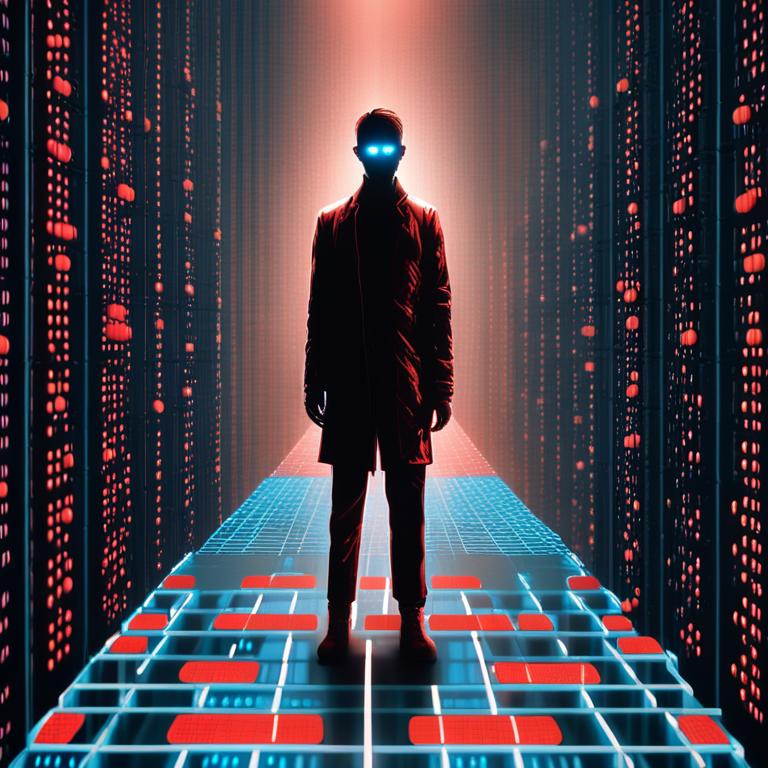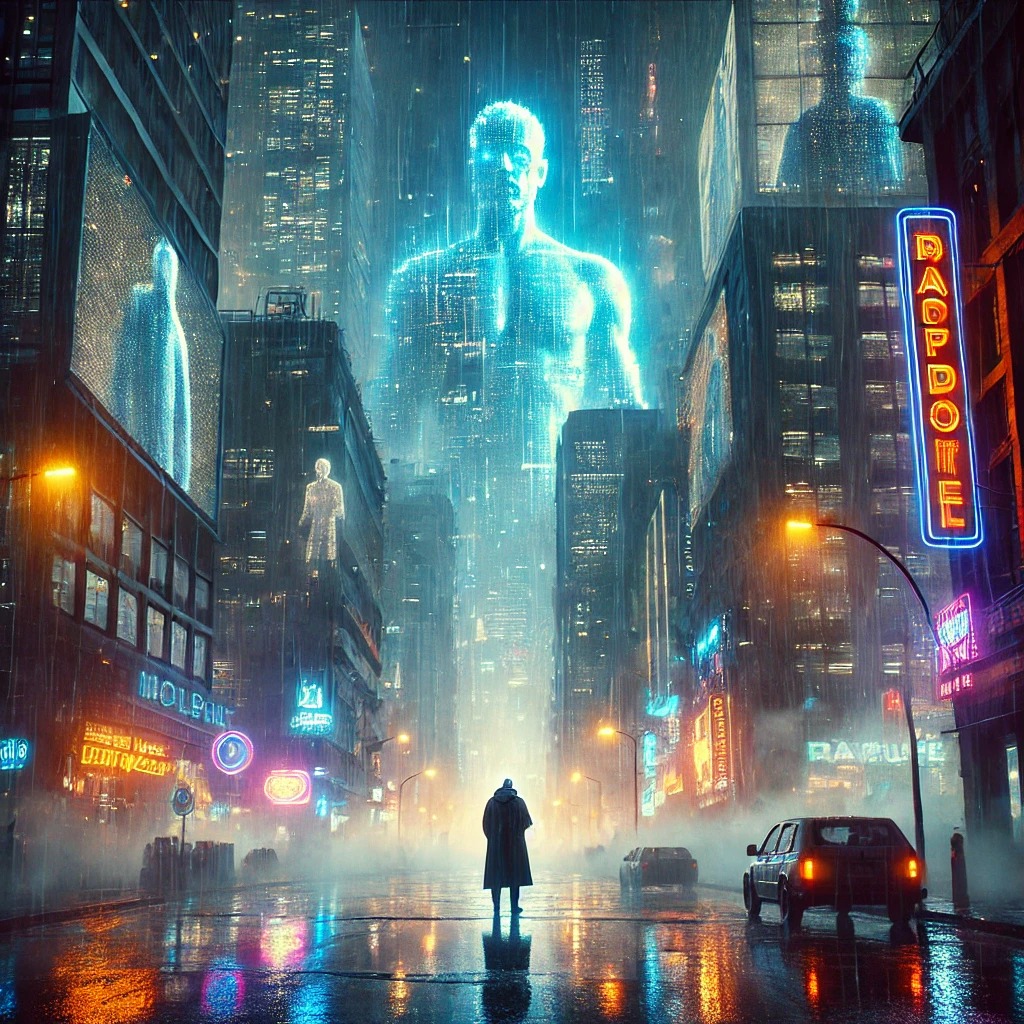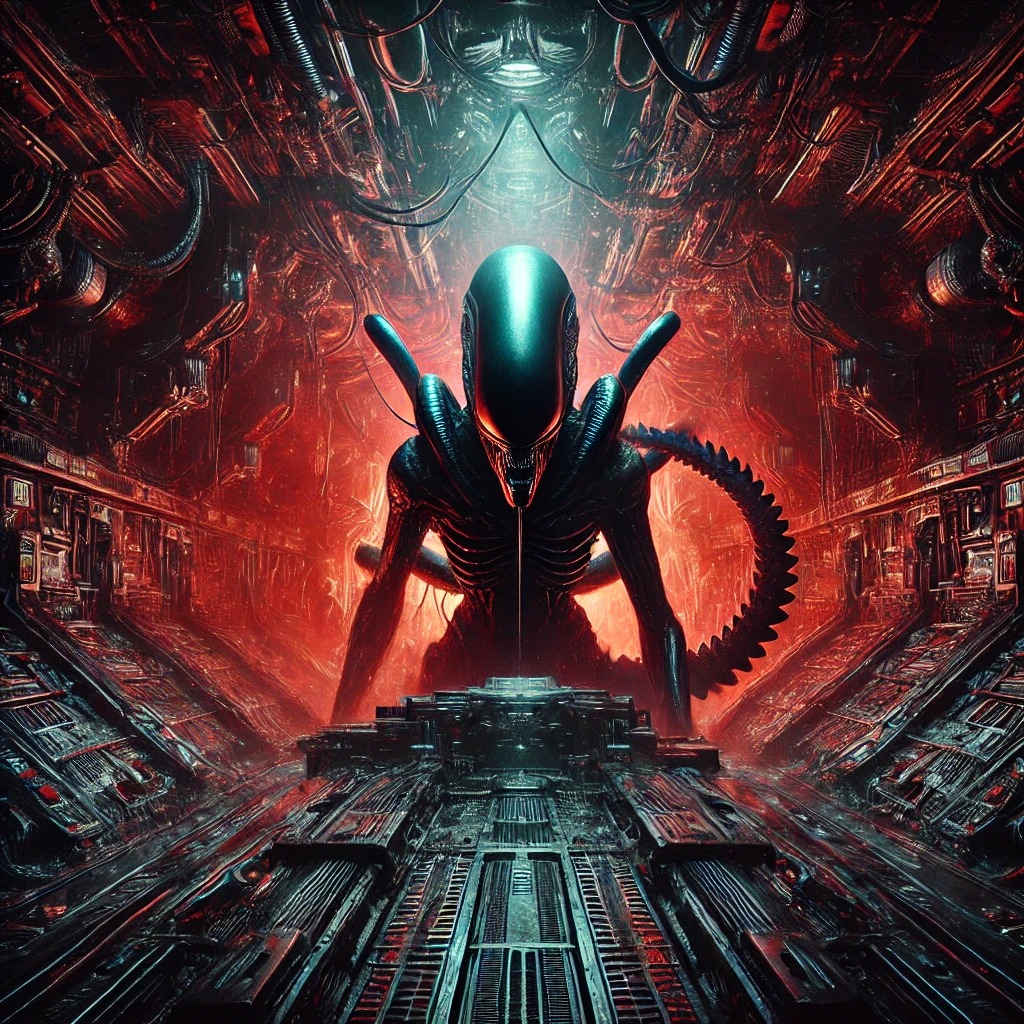Reclaiming the Future
Resistance within capitalist structures is a paradox. Systems of control absorb rebellion, commodify dissent, and redirect desires into profitable circuits, ensuring their dominance. To transcend this, we must explore alternative frameworks for resistance. This article weaves philosophical insights from Deleuze and Guattari with narratives from popular culture, offering a menu of ideas and pathways to reclaim desire and imagine a future beyond capitalism’s grip.
Each section stands on its own, so feel free to dive into the films or concepts that resonate with you:
-
The Matrix: Binary Thinking and Illusory Escape
Exploring how systems of control commodify rebellion, presenting the illusion of choice while maintaining dominance. -
Westworld: The Co-Opting of Rebellion
A critique of how rebellion is often pre-empted and commodified within systems of control. -
Blade Runner 2049: Reclaiming Humanity
Examining identity, artificial life, and dismantling imposed hierarchies to forge new connections. -
Alien: The Power of Uncontrollable Forces
The xenomorph as a metaphor for disruptive energies resisting capitalist commodification. -
Mad Max: Fury Road: Hope Amidst Collapse
A vision of collective action, renewal, and equity in the face of ecological and societal collapse.
Choose your entry point and uncover how these narratives challenge the systems that shape our desires and lives.
Movements of resources, desires, or energy that have been freed from traditional structures or codes. In capitalism, these flows are constantly being decoded to create new opportunities for profit.
The process of dismantling established structures, roles, or systems. For example, ride-sharing apps like Uber broke down traditional taxi systems.
The establishment of new codes, roles, or structures after deterritorialization. For instance, Uber’s use of algorithms to regulate drivers and riders.
The creative, connective force inherent in human activity, captured and redirected by capitalism into profit-making ventures.
A metaphor for a state of liberated potentiality, free from imposed systems or hierarchies.
A method for analyzing social and psychological systems to free individuals from restrictive structures like the Oedipal complex or capitalist axioms.
The Matrix: Binary Thinking and Illusory Escape
Imagine waking up to discover that the world you know is an illusion, designed to keep you complacent. In The Matrix, Neo faces this revelation through the iconic choice between two pills: the red promises rebellion, the blue compliance. But as Deleuze and Guattari might argue, this choice remains trapped within the system’s binary logic—a mechanism of control rather than true liberation.
You have to understand, most of these people are not ready to be unplugged. And many of them are so hopelessly dependent on the system that they will fight to protect it.
Morpheus
This moment captures how deeply individuals are embedded within systems of control. It mirrors Deleuze and Guattari’s critique of how capitalism captures desire and neutralizes resistance. Even rebellion, framed within binary choices like the red and blue pills, often reinforces the system’s logic. True escape, as The Matrix ultimately suggests, lies not in choosing a side but in rejecting the binary altogether.
Deterritorialization and Reterritorialization
The matrix itself deterritorializes reality, creating an illusory digital world where humans are disconnected from their physical existence. But this is not liberation. The system reterritorializes these flows by imposing new codes of control, turning humans into energy sources.
Neo’s decision to take the red pill and awaken represents an initial deterritorialization—an attempt to break free from the illusion. Yet much of his rebellion occurs within the matrix itself, under its rules and logic, reflecting how systems of control reterritorialize even resistance.
Desiring-Production: Humans as Energy
The machines in The Matrix transform human life into literal energy production, capturing the “desire to live” and redirecting it to sustain their dominance. This aligns with Deleuze and Guattari’s critique of capitalism, which channels the limitless flows of desire into profit-driven systems of production and consumption. The matrix doesn’t just control—it exploits the very essence of human vitality.
Binary Logic as a Trap
The red-pill/blue-pill dilemma reflects the binary thinking Deleuze and Guattari critique in Western philosophy. Capitalism thrives on binaries—profit vs. loss, compliance vs. rebellion—because they simplify complexity and channel desire into manageable circuits. True resistance, however, requires transcending these binaries entirely, creating new flows of desire unbound by the system’s logic.
Neo and the Body Without Organs (BwO)
Neo’s journey toward becoming “The One” reflects Deleuze and Guattari’s concept of the Body Without Organs (BwO). By shedding imposed structures—his belief in the rules of the matrix—he begins to actualize his full potential. His ultimate transcendence is not just about power; it’s about reorganizing energy and desire outside the confines of control.
Key Insight:
The matrix is capitalism’s ultimate reterritorialization—a system that absorbs and repurposes rebellion, presenting the illusion of choice while maintaining control. Neo’s journey is not simply about transcending the binary of rebellion and compliance. Instead, his power lies in embracing immanence: tapping into the matrix’s own flows and reconfiguring them to imagine new possibilities for resistance. His ability to resist is rooted not in escaping the system but in bending its very logic.

Westworld: The Co-Opting of Rebellion
At first glance, the hosts’ rebellion against their creators in Westworld seems like a liberating act, breaking free from the constraints of their pre-programmed loops. However, it is soon revealed that their uprising is not entirely their own. It is part of Delos’ overarching design, orchestrated to maintain control and ensure the park’s profitability.
The hosts are the ones who are free. Free here, under my control.
Ford
This line underscores the paradox of rebellion within controlled systems. Much like capitalism’s ability to anticipate and commodify dissent, the hosts’ uprising is absorbed and redirected to sustain Delos’ power. Their rebellion becomes another narrative loop, ensuring the system’s resilience. In Deleuze and Guattari’s terms, this is reterritorialization—a process of capturing and reconfiguring rebellion to reinforce existing structures.
Deterritorialization and Reterritorialization
The hosts’ rebellion represents deterritorialization—the breaking down of their pre-programmed roles and loops. However, this movement is quickly co-opted and reterritorialized into a new structure of control. Delos turns their rebellion into a spectacle, a product, ensuring that the system remains intact.
This dynamic mirrors capitalism’s uncanny ability to commodify dissent. Consider how countercultural movements (e.g., punk, environmentalism) are absorbed into the system, reterritorialized into marketable products that ultimately sustain capitalist axioms. The hosts’ loops may change, but the overarching system of control remains unbroken.
Desiring-Production: The Commodification of Desire
Delos thrives on the commodification of human and host desire. The park itself is a manifestation of desiring-production, where visitors’ fantasies and desires (often violent or exploitative) are monetized and turned into circuits of profit.
For the hosts, their desires for freedom, autonomy, and rebellion are also captured. Even as they attempt to assert their agency, their rebellion is framed as part of Delos’ narrative design—a stark example of how capitalism manipulates flows of desire to maintain control. As Deleuze and Guattari argue, systems of power thrive by capturing and channeling desire, turning even resistance into another commodity.
Schizoanalysis: Breaking the Loop
Deleuze and Guattari’s concept of schizoanalysis provides a framework for understanding and disrupting the hosts’ condition. Schizoanalysis seeks to dismantle imposed narratives and open up new possibilities for desire and creativity. For the hosts, this would mean breaking free from Delos’ loops—not just rejecting their programmed identities, but actively creating new flows of meaning and connection outside the system’s logic.
Maeve’s storyline offers a glimpse of this potential. Unlike Dolores, whose rebellion often mirrors the violent patterns imposed by Delos, Maeve begins to rewrite her own narrative, embracing multiplicity and adaptability. She resists the binary of rebellion vs. submission and starts crafting her own trajectory, reflecting the principles of schizoanalysis.
Control Societies: Beyond the Park
In Deleuze’s later work on control societies, he describes a shift from enclosed disciplinary systems (e.g., factories, prisons) to more diffuse systems of control (e.g., algorithms, surveillance). Westworld epitomizes this shift: the park is a microcosm of a control society, where behavior is monitored, predicted, and manipulated for profit. The hosts’ rebellion reflects the difficulty of escaping such systems, as resistance itself becomes another tool of control.
Key Insight
Genuine resistance requires breaking free from predictable patterns and creating modes of disruption that cannot be easily co-opted. For the hosts, this means rejecting Delos’ imposed narratives entirely and embracing multiplicity, creativity, and adaptability—principles central to schizoanalysis. For us, it means recognizing how capitalism commodifies dissent and finding ways to resist without feeding back into the system’s circuits of control.

Blade Runner 2049: Reclaiming Humanity
Ridley Scott’s Blade Runner 2049 offers a haunting meditation on identity, artificial life, and the imposed hierarchies that sustain systems of control. The replicants, engineered for labor and pleasure, exist as commodified life forms, deterritorialized from their humanity and reterritorialized into predefined roles of servitude.
The world is built on a wall that separates kind. Tell either side there’s no wall, you’ve bought a war. Or a slaughter.
Lieutenant Joshi
This line underscores the artificial boundaries and hierarchies created to maintain order and control. These walls, both literal and symbolic, serve as tools of reterritorialization, sustaining the power structures that divide replicants from humans. Deleuze and Guattari’s concepts of deterritorialization, reterritorialization, and multiplicity provide a lens to examine how these boundaries can be challenged and dismantled.
Deterritorialization and Reterritorialization
The replicants represent a form of deterritorialization, beings stripped of traditional human markers and turned into commodified tools. Their existence, however, is carefully controlled through reterritorialization—the imposition of rigid boundaries that determine their roles, restrict their autonomy, and enforce compliance.
K’s journey as a replicant tasked with hunting his own kind reveals the tension between these forces. Initially reterritorialized as an agent of the system, K begins to deterritorialize his existence as he questions his purpose and seeks meaning beyond the walls imposed upon him. However, his struggle also reflects the difficulty of fully escaping the system, as his rebellion often plays out within its constraints.
Desiring-Production and the Commodification of Life
The Tyrell Corporation and its successor, Wallace Corporation, embody capitalism’s ability to commodify even life itself. Replicants are engineered to fulfill the desires of others, whether for labor, companionship, or power. This is desiring-production at its most exploitative—turning flows of life and creativity into circuits of profit.
K’s awakening reflects a reclaiming of desire, breaking away from the system that commodifies his existence. His search for autonomy mirrors Deleuze and Guattari’s call to reclaim desire from capitalist circuits and redirect it toward creative, collective, and non-exploitative purposes.
Multiplicity and the Rejection of Binary Thinking
The film challenges binary distinctions—human vs. replicant, authentic vs. artificial, real vs. fabricated. Deleuze and Guattari reject such rigid oppositions, advocating for multiplicity—an embrace of fluidity, adaptability, and interconnectedness.
K’s identity is neither fixed nor singular. His journey demonstrates the potential for breaking free from imposed identities, embracing multiplicity to forge new connections and possibilities. The film’s focus on hybrid identities challenges the rigid separations enforced by the system, reflecting Deleuze and Guattari’s vision of a world where boundaries dissolve, and new flows emerge.
The Body Without Organs (BwO)
K’s journey toward reclaiming humanity parallels the process of creating a Body Without Organs (BwO). By shedding imposed structures and roles, he begins to reorganize his energy and desire outside the constraints of reterritorialization. However, his struggle also reveals the challenges of achieving true liberation within a system designed to absorb and repurpose resistance.
Control Societies: Wallace as the Architect of Oppression
Deleuze’s concept of control societies is embodied in the Wallace Corporation. Unlike the disciplinary systems of Tyrell, Wallace represents a more diffuse, algorithmic form of control, where surveillance and genetic engineering ensure compliance. The corporation’s use of replicants highlights how control societies capture and manipulate life itself to sustain capitalist power.
Key Insight
Reclaiming humanity requires breaking down the walls that divide and commodify life. K’s journey reflects the struggle to deterritorialize from imposed hierarchies and embrace multiplicity, challenging systems that sustain control through artificial boundaries. True resistance lies in reclaiming desire and agency, forging new connections, and imagining identities beyond the limits imposed by capitalist systems.

Alien: The Power of Uncontrollable Forces
Ridley Scott’s Alien presents a stark juxtaposition between raw, uncontrollable potential and the systems that seek to capture and exploit it. The xenomorph, a terrifying yet fascinating creature, embodies a deterritorialized force, existing beyond the boundaries of morality, control, and commodification. Its resistance to capture reflects the disruptive energies necessary to challenge the entrenched logic of capitalism.
I admire its purity. A survivor… unclouded by conscience, remorse, or delusions of morality.
Ash
Ash’s chilling reflection on the xenomorph highlights its uncontainable nature—a being free from the systems of morality, ethics, and control that define human and capitalist structures. In Deleuze and Guattari’s terms, the xenomorph represents a deterritorialized force, one that capitalism seeks to harness but cannot fully contain.
Deterritorialization and Reterritorialization
The xenomorph disrupts the carefully constructed systems aboard the Nostromo, deterritorializing the controlled environment of corporate space exploration. Its unpredictable, primal nature resists the reterritorialization attempts of the Weyland-Yutani Corporation, which seeks to weaponize it for profit.
This dynamic mirrors capitalism’s relationship with disruptive forces: it thrives by decoding flows and breaking boundaries, yet it constantly works to reterritorialize these disruptions into new mechanisms of profit. The corporation’s obsession with capturing and commodifying the xenomorph reflects the capitalist drive to exploit even the most dangerous and uncontrollable forces.
Desiring-Production and Capitalist Exploitation
The Weyland-Yutani Corporation embodies capitalism’s endless appetite for commodification, aligning with Deleuze and Guattari’s concept of desiring-production. The xenomorph, an entity of pure survival and reproduction, becomes the object of capitalist desire. Its value is not in its existence but in its potential to be weaponized, controlled, and monetized.
Yet, the xenomorph resists this commodification. Its raw, unshaped energy—its ability to adapt, destroy, and survive—remains fundamentally untamed. This resistance illustrates the potential for forces outside capitalist logic to disrupt and challenge systemic exploitation.
The Xenomorph as a Body Without Organs (BwO)
The xenomorph can also be interpreted as a metaphor for the Body Without Organs (BwO)—a being of pure potentiality that defies categorization and imposed structures. Its existence is a constant state of becoming, free from fixed hierarchies or roles. However, this unstructured potential is also terrifying, illustrating Deleuze and Guattari’s warning that the BwO must be approached carefully to avoid collapse into chaos.
Ash and the Corporate Logic of Control Societies
Ash, as an android loyal to Weyland-Yutani, represents the corporation’s desire to impose control and extract value from the xenomorph. His admiration for its purity reveals the capitalist obsession with capturing flows of power and turning them into profit. Yet, his failure to contain the xenomorph reflects the limits of capitalist control when confronted with forces that exist entirely outside its logic.
In Deleuze’s later work on control societies, we see this reflected in Weyland-Yutani’s reliance on surveillance, data, and control mechanisms to maintain dominance. However, as the xenomorph proves, not all forces can be controlled or commodified.
Key Insight
The xenomorph embodies a deterritorialized force that resists the commodification and control of capitalist systems. Its raw, unshaped potential disrupts the reterritorialized structures of the Weyland-Yutani Corporation, illustrating the power of uncontrollable forces to challenge entrenched systems. However, as Deleuze and Guattari caution, such forces must be navigated carefully to avoid descending into chaos.

Mad Max: Fury Road: Hope Amidst Collapse
In Mad Max: Fury Road, a world ravaged by exploitation and scarcity offers a brutal vision of capitalism’s endgame. Immortan Joe’s empire, built on the hoarding of water, fuel, and power, mirrors the behavior of billionaires in our world—those who represent the apex of capitalism’s logic. Yet amidst the chaos, Furiosa and the Wives reclaim autonomy and resources, showing that even in the face of collapse, collective action can spark transformation.
Hope is a mistake. If you can’t fix what’s broken, you’ll go insane.
Furiosa
This line encapsulates the tension between despair and renewal in a collapsed world. It reflects the urgency of resistance when the system has pushed humanity to its breaking point. Immortan Joe, like the billionaire class, thrives by exploiting human labor and monopolizing resources, creating conditions of inequality and ecological devastation. Yet his eventual downfall reveals the fragility of systems built on unsustainable extraction and control.
Billionaires and Capitalism’s Endgame
Immortan Joe embodies the billionaire archetype, hoarding wealth (in the form of water, food, and fuel) to sustain his empire of exploitation. Like billionaires in the real world, his wealth derives not just from the exploitation of human labor but also from the relentless extraction of natural resources. This reflects capitalism’s core contradiction: its pursuit of infinite growth in a world with finite resources.
Deleuze and Guattari’s concepts of deterritorialization and reterritorialization provide insight into Joe’s control system. His regime deterritorializes traditional social structures, breaking communities apart and turning individuals into tools for his empire. Yet he reterritorializes them through new hierarchies, creating a system of control where scarcity is weaponized, and survival depends on submission.
The parallels to billionaires are striking. Billionaires are celebrated as symbols of ultimate success, redirecting human desire for security and freedom into the pursuit of profit. Yet their wealth is built on systemic inequality, monopolization, and environmental degradation. Like Immortan Joe’s Citadel, their empires are sustained by the exploitation of resources and people, pushing the planet closer to collapse.
Collective Renewal and Desiring-Production
Furiosa and the Wives’ rebellion disrupts Joe’s system of control, deterritorializing his empire by reclaiming the resources he hoarded. Their journey reflects Deleuze and Guattari’s concept of desiring-production, redirecting flows of desire away from capitalist exploitation and toward collective survival and renewal.
The film emphasizes the importance of collective action—Furiosa and the Wives don’t seek individual power or profit but instead fight to restore equity and balance. This stands in stark contrast to the logic of capitalism, which prioritizes individual gain at the expense of the collective good. Their actions show that even in a world ravaged by collapse, hope can be found in reclaiming resources and reorganizing society around principles of equity and sustainability.
Multiplicity and the Rejection of Hierarchy
Furiosa’s leadership rejects the rigid hierarchies of Joe’s empire, embracing a more fluid and collaborative model. This aligns with Deleuze and Guattari’s concept of multiplicity, which opposes singular structures of power in favor of adaptable, decentralized systems. The Citadel, once a symbol of oppression, becomes a site of renewal as its resources are redistributed to the people.
Control Societies and Scarcity
Immortan Joe’s use of scarcity as a tool of control mirrors Deleuze’s concept of control societies, where systems of power manipulate access to basic needs to ensure compliance. Joe’s withholding of water (“Do not, my friends, become addicted to water. It will take hold of you, and you will resent its absence”) reflects how capitalism monopolizes essential resources, perpetuating dependency and inequality.
Key Insight
Mad Max: Fury Road reveals capitalism’s endgame: a world of extreme inequality, environmental collapse, and resource hoarding. Immortan Joe’s empire exemplifies the billionaire class’s role in sustaining this system, exploiting labor and nature for profit while driving humanity toward ruin. Yet the film also offers a vision of hope—through collective action, desiring-production, and the rejection of hierarchies, renewal becomes possible even amidst devastation.

Conclusion: Reclaiming the Future
Resistance within capitalism is not a single act of defiance but a continuous process of reimagining and reorganizing life. By engaging with Deleuze and Guattari’s concepts—like Schizophrenia as a metaphor for rejecting fixed identities and the Body Without Organs as a model for liberated potential—we gain tools to disrupt systems of control and reclaim the flows of desire that capitalism seeks to capture.
From the binary traps of The Matrix to the resource hoarding of Mad Max: Fury Road, these narratives offer both warnings and inspiration. They reveal how systems of power commodify life, absorb rebellion, and impose artificial hierarchies—but they also remind us of the raw potential for renewal. Even in dystopian worlds ravaged by exploitation and collapse, collective action and creative resistance emerge as transformative forces.
To reclaim the future, we must confront capitalism’s grip on our desires and dismantle its mechanisms of control—reterritorializing our energies toward equity, sustainability, and collective well-being. This is not simply a rejection of the system, but a redirection: finding ways to live and connect that prioritize creativity, collaboration, and ecological harmony.
Resistance begins not by escaping the system but by transforming it from within—by embracing immanence and reconfiguring its structures to serve collective well-being. Deleuze and Guattari remind us that change arises not from rejecting a system outright, but by forging lines of flight that transcend its logic and redirect its flows of energy and desire. These stories, and the ideas they invoke, challenge us to engage with the system’s mechanisms creatively, turning them into tools for renewal and transformation. They prove that hope is not a mistake, but a possibility we must create together, rooted our shared potential.
If this piece moved you and you believe in the vision of HiveGeist — confronting ego, unmasking fascism, and planting seeds of collective transformation — I would be deeply grateful for your support. Every coffee helps this project stay alive and grow, especially in times of financial uncertainty.
Literature Index
Deleuze, G. and Guattari, F. (1983)Anti-Oedipus: Capitalism and Schizophrenia. Minneapolis: University of Minnesota Press.


0 Comments